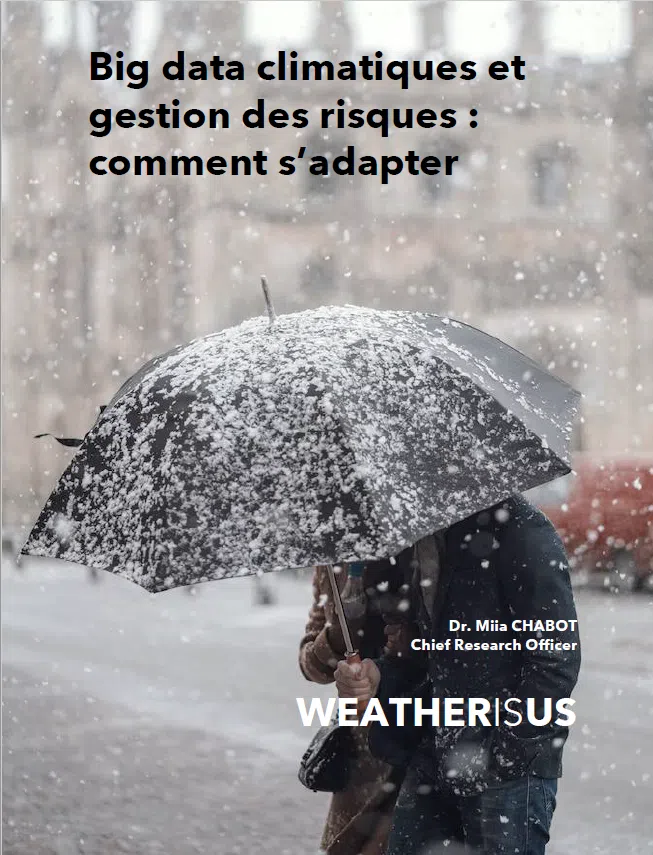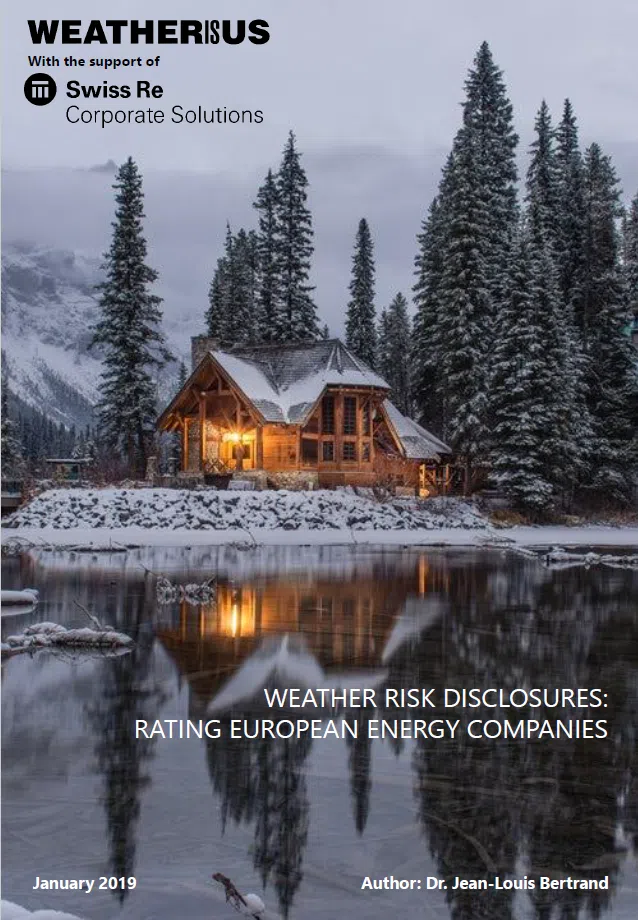Climate change is one of the greatest challenges facing humankind this century. It is likely to result in more frequent and severe climatic events, with the potential to cause substantial disruption to our economies, businesses, and livelihoods in the coming decades. Yet, the associated risks, particularly for businesses, remain poorly understood by decision makers, and are under-researched by academics.
ECONOMIC ACTIVITY AS A FACTOR IN CLIMATE CHANGE
On the one hand, there is the impact of economic activity on the climate, in particular greenhouse gas emissions, which are responsible for the increase in average temperature, climate variability and the number and intensity of extreme events. Economic actors must transition away from fossil fuels, a transition led by governments by imposing laws, regulations, and a price on carbon, at rates and costs for businesses that are not readily predictable, giving rise to what is known as transition risk.
CLIMATE CHANGE AS A RISK FOR THE ECONOMY
On the other hand, there is the impact of climate on the economy. Every day, climate conditions influence what, where, when and how economic actors buy goods and services. They affect sales, production, inventories, supply chains, and prices. In short, they have a direct impact on cash flows, profitability, and the financial strength of many businesses. The increase in climate variability makes it more difficult for companies to manage their business and strategy in an increasingly uncertain world. On top of this, the consequences of extreme events such as flooding, storms, heat waves, and fires lead to supply disruptions, business interruptions, and asset destruction. The impact of climate on business activity refers to physical climate risks.
DOING NOTHING ABOUT CLIMATE CHANGE WILL COST US DEARLY
Due to the inertia of the atmosphere and given the amount of greenhouse gases already accumulated, and the lifetime of those gases, the IPCC scenarii on our ability to reduce the influence of human activity on the climate have in common that global temperature and climate variability will increase significantly over the next 30 years, regardless of the scenario considered. Central banks and regulators are increasingly recognising that the costs associated with physical climate risks may in fact exceed those associated with transition risk. And above all, that the only possible short-term strategy is to better understand the physical risk, in order to better adapt, until the transition from fossil fuels allows global warming to be limited.
RESEARCH IMPACT
For over 10 years, two ESSCA researchers, Jean-Louis Bertrand and Miia Chabot, have focused most of their research on improving knowledge of physical climate risks and their consequences on economic activity, and on providing financial management solutions to businesses most at risk. They were the first to estimate, season by season, the impact of climate conditions on all European sectors of activity. Their research applied to firms in industries as diverse as textiles and clothing, food franchising, energy distribution, automobile, and cosmetics, has allowed these firms to integrate climate change into their strategy and to develop operational and financial adaptation solutions.
INNOVATIVE BUSINESS SOLUTIONS FOR FINANCIAL COVERAGE OF WEATHER RISK
The innovative and useful nature of their research is illustrated in many ways. Firstly, in terms of business applicability. Their work has led to the emergence of a first Insurtech start-up company, with the support of public and private funding promoting the transfer of academic knowledge to industry, and the creation of a second Fintech company based in Angers and London, that structures financial solutions for hedging climate risk.
ACADEMICS AND PROFESSIONAL ASSOCIATIONS AND INSTITUTIONS
Secondly, the academic and institutional level. As an illustration, the first conference in France of the International Finance and Banking Society IFABS (IFABS), with over 6,500 members from more than 67 different countries and one of the world's leading research networks dedicated to promoting cutting-edge research in the fields of banking and finance, was held at ESSCA in Angers in 2019. The theme of the conference, chaired by M. Chabot and J-L. Bertrand, was ‘Reinventing banking and sustainable finance in a context of low interest rates, climate change, TCFD, AI and Fintech’. Another illustration is that Miia Chabot supervises a PhD student in the context of a collaboration between ESSCA Knowledge and ENSAM, whose thesis aims at deepening the knowledge of physical climate risk by using big data processing and artificial intelligence techniques. Finally, the distinctive expertise of the two researchers allows them to interact with professional associations and institutions. For example, Jean-Louis Bertrand takes an active role in the Weather Risk Management Association, and in European associations of corporate treasurers who manage financial and non-financial risks in a wide variety of activity sectors. He is also vice-president of the IPCC Pays de la Loire and serves on the board of the Ecole Nationale de la Météorologie in France.
RESEARCH OUTPUT
Over the years, climate risk and its consequences on businesses and the economy has become a major, distinctive, and recognised research focus for ESSCA Knowledge. Books, book chapters, white papers, scientific articles in leading journals, and communications in public media, have disseminated the two researchers’ work to a wide audience of academics, practitioners, and the general public, including ESSCA students and alumni. This research is now anchored in the ESG framework for the benefit of future research opportunities and for the benefit of ESSCA students, some of whom, this year, have become the first in the world to benefit from the integration of the CFA Institute's certification in ESG investment into an academic programme.
REFERENCES
White Papers
Big data, climate risks, and risk management: The keys to adaptation
25 pages - by Dr Miia Chabot - October 2022
The Impact of Climate Variability on Major European Economies
42 pages - by Dr Miia Chabot, Dr Jean-Louis Bertrand, Valentin Courquin - February 2021
Weather Risk Disclosures: Rating European Energy Companies
108 pages - by Dr Jean-Louis Bertrand - January 2019
- Chabot M. (2020). The Weather Risk Management Market: Status Report and Opportunities. Weatherisus Research Paper. February 2020
- Bertrand J.-L., Chabot M., Hershey L. (2016). Measuring and managing weather variability: protecting business from WeatherRisks. Meteo Protect whitepapers - papers.ssrn.com
- Bertrand J.-L., Chabot M (2015). Ranking the impact of climate variability on UK retail sectors: a path to resilience, Meteo Protect whitepapers
- Bertrand J.-L., Chabot M (2015). The impact of climate variability on the private: reconciling business and climate change horizons, Meteo Protect whitepapers
- Bertrand J-L, Créhalet E., Fortin M. (2013). Demystifying climate effects. Research report, Kepler-Cheuvreux ESG, November 2013
Books and book chapters
- Bertrand J-L. (2011). La gestion du risque climatique en entreprise. Editions Revue Banque. Paris iv
- Bertrand J.-L., Sinclair Desgagné B., (2011). Environmental risks and financial markets: a two-way street, in P. Bansal and A. J. Hoffman (eds). The Oxford Handbook of Business and the Natural Environment, Chapter 26, pp. 482-501
Scientific Articles
- Bertrand J.-L., Chabot M., Brusset X. (2021). Protecting franchise chains against weather risk: A design science approach, Journal of Business Research, 125: 187-200
- Bertrand J.-L., Chabot M. (2020). Stock Returns and Weather: The Case of European Listed Energy Firms. Finance, 41(3):51-92
- Chabot M., Bertrand J.-L. (2018). The contribution of weather variability to economic sectors, Applied Economics, 50(43):4632-4649
- Bertrand J.-L., Brusset X. (2018). Hedging weather risk and coordinating supply chains, Journal of Operations Management, 64(1): 41-52
- Bertrand J.-L., Chabot M. (2017). Severe Weather Threatens Businesses. It’s Time to Measure and Disclose the Risks, Harvard Business Review
- Bertrand J.-L., Chabot M. (2017). Understanding the economic effects of abnormal weather to mitigate the risk of business failures, Journal of Business Research, 98: 391-402
- Bertrand J.-L., Chabot M. (2017). No more blaming the weather: a retailer’s approach to measuring and managing climate variability, International Journal of Retail & Distribution Management, 45 (7/8), 730-761
- Bertrand J.-L., Brusset X., Fortin M. (2015). Assessing and hedging the cost of unseasonal weather: an illustration from the apparel sector. European Journal of Operations Research, 243(2), 345-363









